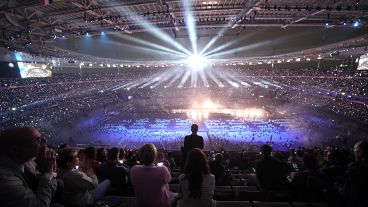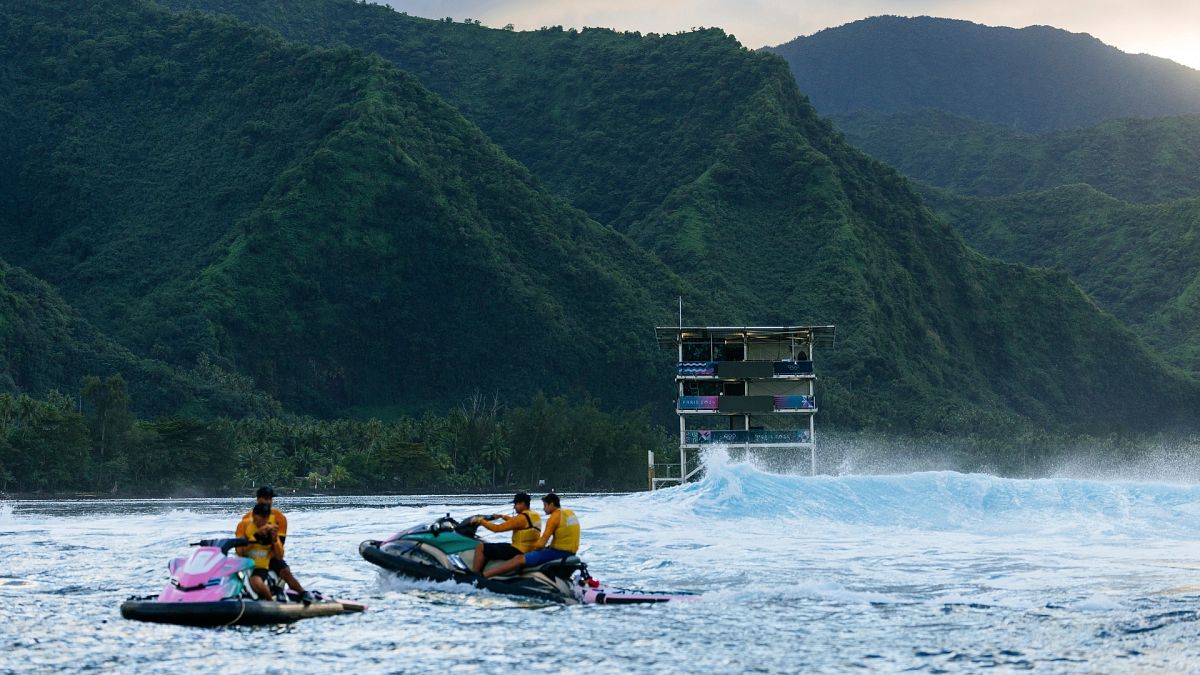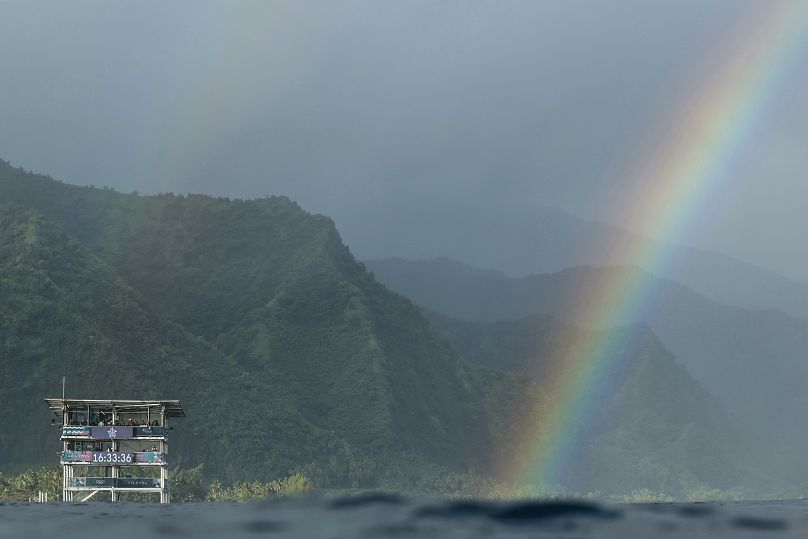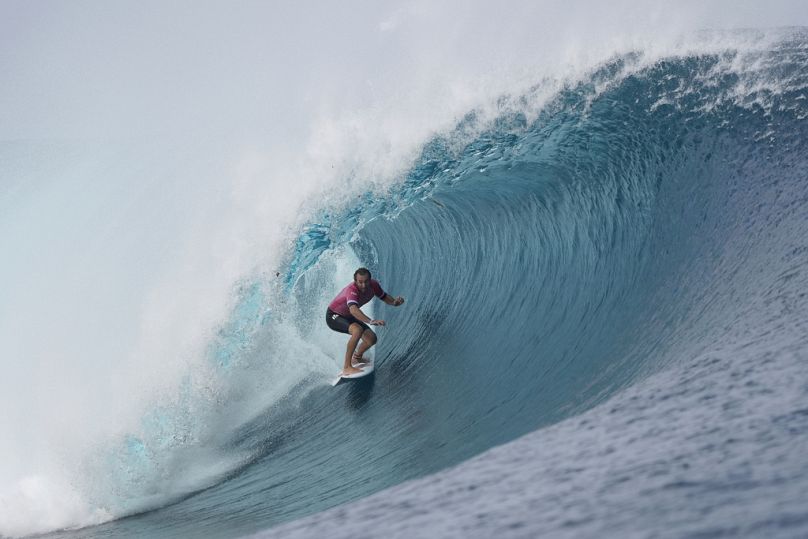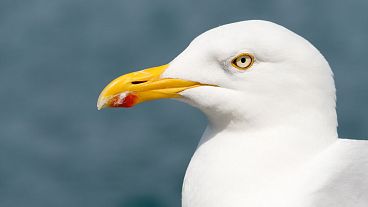A wooden judging tower has stood on this surf break for two decades but organisers had plans to build something bigger.
Nearly 16,000km away from the main event in Paris, Olympic surfing kicked off in Teahupo‘o, Tahiti, French Polynesia this week.
The event has been the subject of controversy since the venue was announced with concerns about damage to pristine coral reefs from construction work proposed by Olympic organisers.
Residents of Tahiti, surfers, environmental campaigners and the biggest surfing organisation in the world spoke out against the proposed work.
At the centre of this controversy over the venue for only the second Olympic Games to include the sport? A tower used by judges in professional competitions at one of the world’s most famous surf breaks.
How did a judging tower become the centre of a surfing scandal?
Teahupo'o is a small village of a few hundred inhabitants on the Tahitian peninsula. It seems like an unusual location to hold an event as part of the Paris Olympics but surf conditions in French spots such as Hossegor are not great at this time of year.
Off the coast of the French Polynesian island, however, the waves are pumping in late July and early August.
Because Teahupo'o's surf breaks offshore, the Olympic judges have to be out in the lagoon.
A wooden judging tower has stood on its surf break for two decades but organisers said it no longer met the required safety standards. Originally they planned to replace it with a three-story-tall aluminium tower with toilets, air conditioning and space for 40 people - just five more than the previous one.
Concern came from local residents, surfers and environmental campaigners that the construction of a new judging tower could cause damage to the reef's pristine corals. The reef itself is in part what creates Teahupo'o's incredible conditions and surfers worried damage could forever change the character of its waves.
These fragile marine invertebrates also provide a home to a wealth of biodiversity and, when damaged, become significantly more vulnerable to heatwaves. Anchoring the tower or installing pipework for its toilets could leave scars on the reef that would take years to recover.
After months of debate local activists, surfers and Olympic organisers finally reached a compromise. But it didn’t come without significant bumps along the way.
A timeline of the Teahupo‘o tower controversy
September 2023 - Olympic organisers announce that they are planning to replace the wooden tower with a $5 million (€4.6m) three-story-tall, aluminium structure that will have air conditioning, toilets and space for 40 people. Paris 2024 says it is needed to meet safety standards.
Not long after, local environmental protection groups and residents begin holding peaceful protests against the construction of the tower. Social media campaigns led by Tahitian big wave pro surfer Matahi Drollet start to gain a lot of support on Instagram and TikTok.
Campaigners argue that having committed to the Sports for Nature pledge, the International Olympic Committee has a duty to leave the reef healthier than it was before the competition.
October 2023 - A petition is launched by residents and visitors of Teahupo’o and Māòhi Nui calling for the original plan to be scrapped. It asks organisers to use the original wooden tower for the Olympic competition.
The petition gains more than 250,000 signatures from all over the world including one of the most successful professional surfers of all time, Kelly Slater.
17 November 2023 - Following these protests, organisers including Paris 2024 and the French Polynesia government decide to build a smaller and lighter tower on the site. It will still require foundations in the reef, though these won’t have to be as deep as with previous plans and will need smaller equipment for construction.
“The Polynesian Government, Paris 2024 and the Haut-Commissariat have studied all possible options to improve the project in recent weeks,” they say in a statement.
“These options have emerged in light of the concerns expressed about the installation of a new judges' tower and its foundations for the organisation of the Olympic Games surfing events and other competitions.”
1 December 2023 - Tahiti residents report that a barge being used to build the new Olympic surf tower has snagged on the reef, damaging the corals near the contest site. Footage emerges from Save Teahupo'o Reef - a coalition of locals, surfers and environmental NGOs - claiming to show the damage done.
Work on the new tower is put on hold following the damage.
7 December - France’s Sports Minister Amelie Oudea-Castera rules out moving Olympic surfing events away from Tahiti despite the damage to the reef.
“We're on the right path to have a new, resized judges' tower that corresponds to requests made by locals,” she says.
19 December 2023 - World surfing body the International Surfing Association (ISA) joins those opposing the tower.
It announces that it “will not support the construction of the new aluminium judges’ tower at Teahupo’o”. In a statement, the ISA says it has previously proposed more environmentally friendly solutions such as building the tower on land or using digital cameras on the wooden tower to broadcast images back to judges.
These suggestions were shut down by organisers who said that judges wouldn’t have good enough visibility from shore and filming from boats would make it “impossible to observe the competition properly”.
Organisers say they will press ahead with the construction of the smaller, lighter tower despite the ISA’s objections, claiming the plan has local support.
January 2024 - Paris 2024 organisers begin holding monthly public meetings where associations, residents and stakeholders can air their concerns. Representatives of the associations are also invited to attend each stage of the installation of the tower.
Polynesian government leader Moetai Brotherson tells news agency AFP he is “totally happy” with how the construction work is being carried out after being “very demanding” with the builders so that no more coral is broken.
April 2024 - Organisers reveal a state-of-the-art collapsable tower with space for 25 to 30 people. It can be deconstructed when there are no surf events.
Annick Paofai, president of the Association for the Defence of Fenua 'aihere, which initially opposed the project, says that “the controversy is completely over”. Some remain critical that any construction has taken place at all while others are pleased that more damaging plans didn’t go ahead.
A World Surf League event serves as a dress rehearsal before the Olympic heats begin on 27 July.

